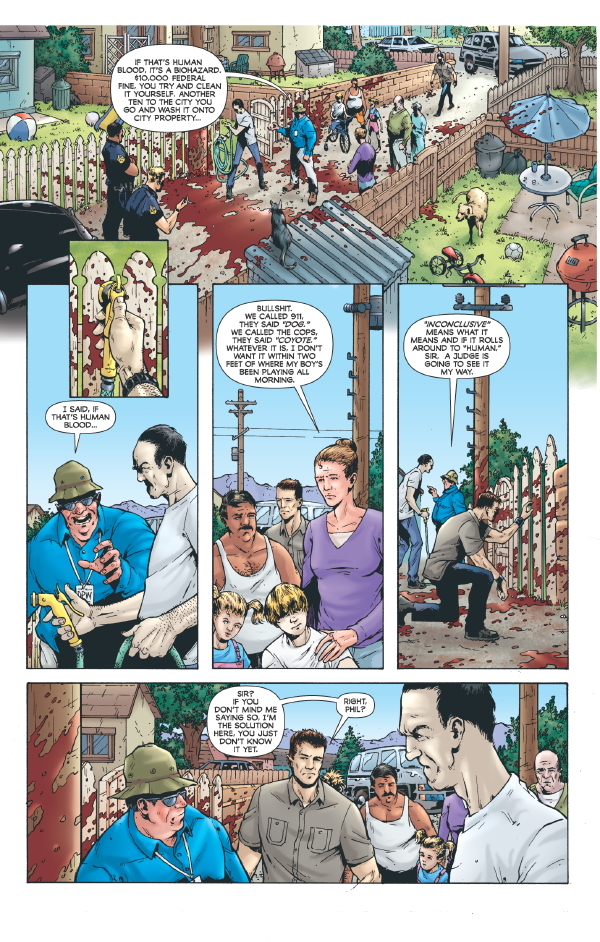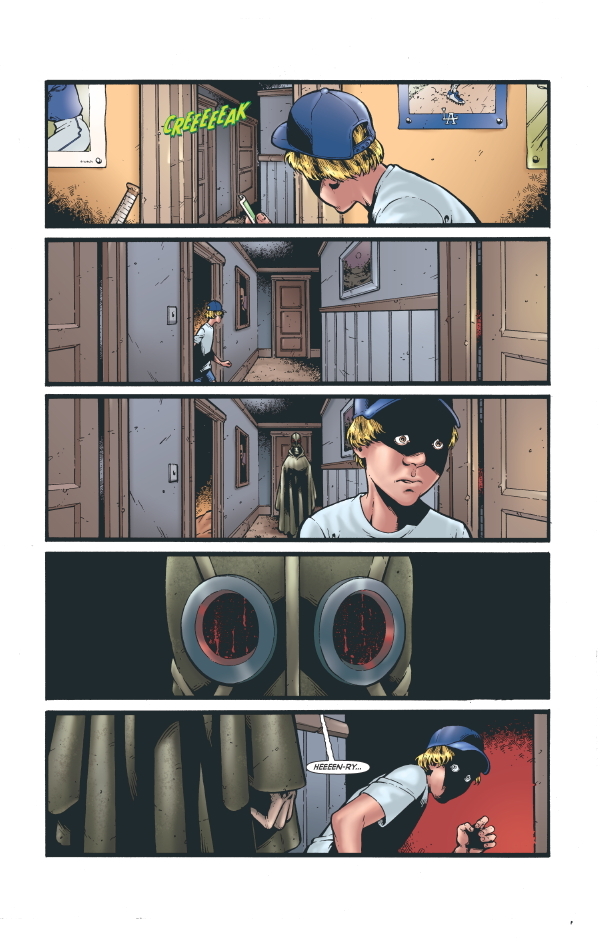 Mark Wheaton is going backwards. Or so it would seem. While there are several stories of comic writers jumping to write for the screen, Wheaton is doing just the opposite. Already a well-established screenwriter, Wheaton has taken his latest story to pages and panels with The Cleaners. Recently, Dark Horse got the chance to speak with Mark Wheaton about the series, and the differences between film and comics.
Mark Wheaton is going backwards. Or so it would seem. While there are several stories of comic writers jumping to write for the screen, Wheaton is doing just the opposite. Already a well-established screenwriter, Wheaton has taken his latest story to pages and panels with The Cleaners. Recently, Dark Horse got the chance to speak with Mark Wheaton about the series, and the differences between film and comics.Dark Horse: The Cleaners is filled with medical phrases and explanations of different instruments; did you ever work as a cleaner yourself?
Mark Wheaton: I’ve never worked as a trauma-scene cleaner, but I’ve worked a lot of minimum-wage jobs that required cleaning things well enough for the health inspector -- washing dishes at a restaurant; washing pots, pans, and the large-scale appliances of a co-op’s industrial kitchen; cleaning floors at a grocery store, etc. And as all three were subject to city inspection related to food storage and preparation, I learned from a young age about the vast range of OSHA standards. You do a job like that long enough and you become a little obsessed -- or, at least, my needlessly overachieving suburban young self -- with how to dot the i’s and cross the t’s for the health inspector. As for the medical phrases and all that, I wrote a movie script once about the world’s largest hospital -- Chris Hani Baragwanath, located in Johannesburg -- and after visiting that place, I just became a bit fascinated not so much in medicine, but in the different processes doctors used to diagnose. It equates quite well to my previous on-the-job education -- an algorithm of checklists to see why what’s meant to be a hygienic system has broken down and how once that system starts breaking down, it rips up everything else.

DH: What brought you and the artist, Rahsan Ekedal, together for this project?
MW: I knew very little about writing comic books, so it was actually another comic writer -- Josh Fialkov -- who heard my pitch for Cleaners after we’d collaborated on an aborted attempt to get his comic Elk’s Run to the big screen (which will inevitably and deservedly one day get there). He got the book in front of Dark Horse Editor Shawna Gore and really worked to convince her that not only should she take a chance on me as a writer, but that he would personally hold my hand down through the learning curve of scripting a comic. When she signed off, I started typing and it was a page from that first issue that was then sent to a handful of artists -- the bit from issue #1 where the city inspector is trying to get Reardon to stop washing off his own fence. When Rahsan’s version came back, I think we were all pretty blown away. Rahsan had met Shawna -- I believe -- at San Francisco’s WonderCon and she’d really been impressed with his art, particularly his incredible attention to detail, and really thought that he’d do a great job with this, something I echoed after soon seeing a lot of his work as well, mainly period details from the Warhammer comic he was drawing for Boom! Though I’d pretty much completed the scripts for the first four issues before I’d seen the first real pages from Rahsan, our collaboration since then -- on the MySpace Dark Horse Presents story, talking about future arcs, and even other comics beyond Cleaners -- has been fantastic and fruitful. One of the best times Rahsan and I had was driving around LA’s west side looking in on which comic shops were carrying Cleaners #2 while breaking the story of a future Cleaners tale.
DH: Being a screenwriter, in what ways are writing comics different from writing for film?
MW: I’ve said this before in a couple of interviews, but I’ll try to expand on it a little. The main differences, I’ve found, from comics to film revolve around pacing and voice. With film, you rely a great deal on the actors to really give voice and expression to dialogue. In comics, the dialogue is meant to be read -- like a book -- but the rest of the visual comes from the artist, so you can’t rely on your regular tricks to break a character and differentiate voice. Similarly, in screenwriting, you’re writing to a flow of images -- people walking, moving, backgrounds changing, action in motion. In comics, you see the same kind of scene play out in your head -- or, at least, I do -- and you have to grab out for the most indicative snapshot for each of the panels to accompany the dialogue. I’m sure this sounds pretty naive to anyone who started out writing comics, but as a screenwriter, I had to train myself to tell a story in snapshots rather than in moving images -- which wasn’t easy.
DH: Do you think it’s easier to build suspense in comics or film? Why?
MW: I get scared in film all the time, but I’ve been truly scared by a comic once -- by a sort of jump-scare panel in Robert Tinnell and Bo Hampton’s Sight Unseen that probably worked because the whole book is just a nasty bit of work. Like anyone, I’ve been scared by images I’ve conjured up in my head from horror prose, but I think my eye kind of keeps my pace regulated when reading a horror comic and it’s harder to con my brain into getting susceptible to a scare. When comparing that to film, I think the static nature of the comic image doesn’t get to benefit from all those immersive tricks you get from a movie -- particularly in the theater when you’re buried in darkness, surrounded by the music, the sound design and the wash of the images. There are so many ways to build and cash suspense in almost any movie -- in-camera tricks, messing with focus, using makeup effects, CGI, jump cuts, and so forth. There’s a barrage of material at your disposal. In comics, it’s the writing and the pencil and the reader is allowed to move at their own pace. That said, when suspense is built in comics -- like the tension bleeding out of arc after arc of The Walking Dead -- it’s just that much more impressive. It means the characters are ones you care enough about to feel for when they’re in jeopardy, it means the art has really created a world that you feel sucked into, and so on.

DH: What attracts you to write about the grisly side of life?
MW: I really have no idea. I guess I have a fairly morbid sense of the world for one reason or another as I think about death all the time, but I’m sure a lot of people do -- atheists, Christians, whatevers -- but don’t necessarily write about it. So, I think I write about it for completely different reasons. My favorite medium to be entertained by is theater -- I love being affected by a good play or musical. Similarly, it’s my favorite medium to write for because you are -- second to second -- focused on the audience experience in very careful ways. With horror, almost no matter what the medium is, it’s all about very carefully playing with your audience -- raising and deflating tension, keeping a real close eye on that barometer. For something to really work as a horror, the writer’s got to be a slave to the reader -- but one that discovers how to tear up its master.
DH: You’ve often said in other interviews that there are murders, suicides, and deaths all around, but that we rarely focus on them. Do you think there’s something about a story like The Cleaners that people are instinctively drawn to?
MW: I think that we really don’t want to focus on the fact that death is around us all the time because it reminds us that our clock is ticking down. A title of a George Clayton Johnson story is always popping in my head—“All of Us Are Dying”—though I wish it wasn’t. I would like to imbue The Cleaners with some kind of that feeling. Be careful, tread lightly. Don’t be such a parasite. Though I’m not Catholic myself, it’s set in a very Catholic world. That said, I’m not so presumptuous to think that anyone’s drawn to The Cleaners at all for any reason other than Rahsan’s cool covers and art. If they’re into the writing and the odd story, great, but I don’t have a sense of if it’s something people are drawn to or will be drawn to.

DH: Both you and Rahsan Ekedal are living in LA, and it really seems to help the tone of The Cleaners, which is set there. Do you think this story could take place in any city, or is there something unique about LA?
MW: I think a story about trauma-scene cleaners facing off against things that may bear the traits of what usually could be considered supernatural could go on in any city in the world. There’s the Indianapolis version, the Stockholm version, the Kinshasa version, etc. But we’re interested in telling the Los Angeles version and—right now -- I like it the best. Because we’re local, we can slip in details everywhere, but also make use of the different areas of the city -- downtown, the vast suburban sprawl of the San Fernando Valley, the Angeles National Forest, the beaches in Malibu, and so on. I think writing and drawing to our location, soaking up everything around us, will hopefully just make for a more realistic setting and work to further engage the reader.
DH: Who inspires you as a comics creator?
MW: A mountain of people. When I walk into my office every day, I see Darick Robertson’s art from his Fury work with Garth Ennis and, even more so, his Transmetropolitan work with Warren Ellis. Same with panels from The Goon. I read Transmet all the way through every so often, same with Preacher, same with Gotham Central, same with Queen & Country. I get giddy about Mouse Guard. I will pretty much buy anyone a copy of anything by Jason -- though I like starting with Why Are You Doing This? -- just because I know they’ll become obsessive and want to read all his stuff. When I see the name “Warren Ellis” on a comic, I buy it. Same with Garth Ennis. When Punisher: War Zone went weekly with the new Ennis/Dillon story, I bought it weekly as I can’t get enough. I love the Ennis Punisher to death. I love the hell out of Scalped and thought Jason Aaron delivered one of the best Ghost Rider adventures ever recently and I’m only saying “one of the best,” because simply referring to it as “the single best Ghost Rider story that’s ever been written” feels like empty hyperbole. I loved the Paul Dini Detective Comics just now. Even though it’s probably as difficult to collate as a 1961 Topps set of baseball cards, I probably have a complete set of Steve Niles comic books and still think he’s the Night Shift/Skeleton Crew–era Stephen King of comics.
And if Niles is the King, Mignola is the Poe, Howard, and Lovecraft. To my discredit, I thought there was no way Hellboy could improve and that its best adventures were behind it. But then you get The Crooked Man, In the Chapel of Moloch, and right now, The Wild Hunt, and know that it’s only getting deeper and richer, while still being as hopelessly page-turning. But then, I’m also a nut for Doug TenNapel (the only comic writer who regularly makes me sob -- don’t ask me to explain the plot of Tommysaurus Rex unless you want a demonstration), Joe Sacco, Ande Parks, and Guy Delisle -- who I wish was writing three books a year and who I tried to teach myself French for as Chroniques Birmanes came out when I was in Paris in ’07, and there wouldn’t be an English translation of it for almost a year. The only time I was ever tempted to buy and actually did buy a maquette was when I saw one from Blacksad, one of the most beautiful books I’ve ever read. I wear an NYC Mech T-shirt -- the one with the robo-duck -- every week and in particular love that comic’s take on the natural world. I find the work of comic creators and artists endlessly inspiring, both as a comics writer, but also working in film and video games. All that said, it was Arkham Asylum -- so many years ago -- that made me start thinking of comics differently and then along came The Filth, which made me know that one day I wanted to try and write one of my own as Morrison just looks like he’s having so much fun. Yes, I probably should’ve offered this long an answer for something more related to Cleaners, but hey, no one’s asked the question before and given me infinite space to reply.
DH: I’m AB. What blood type are you?
MW: AB is actually pretty rare, less than 10% of the population depending on your ethnicity, so good on you. I’m O+ -- just one of the masses. That said, if I ever get a liver transplant, maybe I’ll be like that amazing little girl whose blood type changed.
DH: If you could have any job in the world what would it be?
MW: This will certainly sound lame, but I’m doing it. I get up in the morning and write. I get to work with incredibly talented people -- artists, editors, directors, producers, actors, game developers, etc. -- that make their living through creative endeavors. I love wandering around until I think up something I want to write about. I love going to bookstores and libraries to research the stuff I get to work on. I love going to my mailbox and seeing what articles, books or DVDs are there that someone thinks I should adapt. I wrote my first novel -- a way-too-long, epic, first-person chick-lit novel last year -- just because I had a story that fit that medium and now it might even get published. To me, that’s ridiculous, but I like nothing more than the Quixote-like challenge of galloping full steam at every blank page.
Check out the special “Making of a Comic” featuring The Cleaners #2 by clicking here.